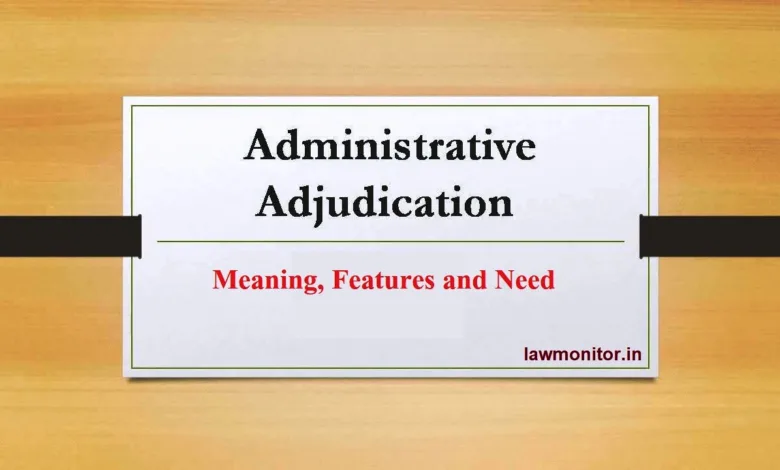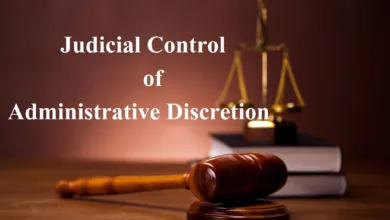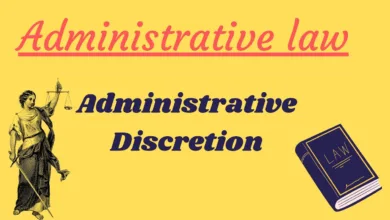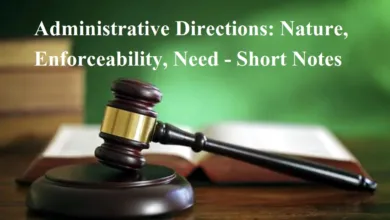Administrative Adjudication and Administrative Decision-Making: Meaning, Features and Need
Administrative decision-making and administrative adjudication have evolved as essential components of modern governance, it refers to federal and state administrative agencies' use of judicial powers granted to them by the legislative branch.

Administrative adjudication refers to federal and state administrative agencies’ use of judicial powers granted to them by the legislative branch.
Introduction:
Administrative decision-making and administrative adjudication have evolved as essential components of modern governance, primarily due to the increased involvement of the state and the corresponding socialization of law. This evolution has been propelled by the recognition that the traditional judicial system, with its highly individualistic and ritualistic approach, might not suffice to provide the necessary quantity and quality of justice required in a welfare state.
Natural Justice and Administrative Decision-Making
The doctrine of natural justice, a fundamental principle in administrative decisions, encompasses crucial procedural rights. It holds wide-ranging application in the exercise of statutory powers by various administrative bodies. However, courts have acknowledged that legislation can explicitly exclude the application of natural justice if clearly expressed. Natural justice is now synonymous with fairness in the concept of justice and remains a widely accepted methodology for governmental action.
Flexibility and Purpose of Natural Justice
Natural justice is not rigid and cannot be confined to a fixed formula; instead, it embodies flexibility. Essentially, it equates to fairness in alignment with common-sense justice. The pivotal question in determining whether natural justice has been upheld in a case is whether the authorities have acted fairly, as highlighted in legal precedents such as Dev Dutt v Union of India (2008) 8 SCC 725. Its application aims to prevent miscarriages of justice, especially considering that administrative agencies, rather than courts, increasingly adjudicate on matters pertaining to personal or property rights.
Need for Administrative Adjudication
(i)It provides a system of adjudication which is informal, cheap, and rapid, unlike the traditional courts.
(ii) It explores new public law standards based on moral and social principles away from the highly individualistic norms developed by courts. For example, the Employees’ State Insurance Scheme in India required a new standard of medical service and treatment to which all the insured population and doctors must conform. The setting up of new standards requires expertise, specialization, and experimentation which can be provided by the administration.
| Daily current affairs Updates | Click Here |
| Law Notes Free Channel | Click Here |
(iii) Emphasis on Preventive Justice: With a shift toward preventive justice over punitive measures, administrative agencies are crucial in executing such measures effectively.
Issues in Administrative Adjudication
However, the strategy of administrative adjudication, while designed to serve public necessity, is often criticized for prioritizing governmental convenience over necessity. Several challenges and issues plague the adjudicative process:
- Number and Complexity of Adjudicative Bodies: The proliferation of adjudicative bodies leads to diverse decisions and procedures due to varying interpretations of natural justice principles.
- Lack of Uniform Appeal Systems: Absence of a standardized appeal system contributes to inconsistency in addressing disputes.
- Invisibility and Anonymity of Decisions: Not all administrative decisions are published, leading to reduced public scrutiny and accountability.
- Unpredictability and Lack of Precedent: Administrative agencies are not bound by precedents, resulting in inconsistent application of law.
- Combination of Functions and Bias: In many disciplinary proceedings, the roles of prosecutor and judge are merged, leading to inherent bias.
- Lack of Evidence Rules and Official Bias: Technical rules of evidence don’t apply, leading to arbitrary decision-making and potential official bias.
- Political Interference and Lack of Transparency: Administrative justice can be susceptible to political interference, undermining its independence and transparency.
- Reasoned decisions: Generally there is no requirement for the administrative authority to give reasons, which undermines the faith in administrative justice.
- Legal representation and cross-examination: There is no general requirement for administrative authority to allow legal representation and cross-examination in every case.
Rules of Natural Justice in Administrative Adjudication
The principles of natural justice focus on specific aspects:
1. That every person whose rights are affected must have reasonable notice of the matter that he has to meet.
2. That he must have a reasonable opportunity of being heard in his’ defence.
3. That the hearing must be an impartial person i.e. A person who is neither directly or indirectly a party to the case. One interested in the litigation is already biased against the party concerned.
4. That the authority of hearing the case must act in good faith and not arbitrarily but reasonably.
Reasons for Growth of Administrative Adjudication
Administrative adjudication has expanded due to various factors:
- Preventive Measures: Administrative bodies can take preventive actions effectively, contributing to better outcomes than reactive measures.
- Inadequacies of the Judicial System: The judiciary’s slow, costly, and complex process has led to the growth of specialized administrative bodies.
- Legislative Deficiencies: Inadequate legislative provisions necessitate delegating powers to administrative authorities.
- Administrative Adjudication protect the rights of citizens at the cost of the state authority. Following mentioned are some of the reasons contributing to the growth of Administrative Adjudication.
Salient features of Natural Justice
The salient features of natural justice are summed up as follows:
1. The allegation should be specific and precise and ought to be produced in writing. The charges framed against the workman on the basis of allegations should be such as are qualitative and specific provisions of the service rules or the notified standing orders applicable to the establishment.
2. Reasonable time should be given to the delinquent the employee to reply to the charge-sheet and prepare for his defense, inquiry is to be conducted.
3. Inquiry officer appointed for conducting domestic inquiry should be totally unbiased and not connected with the incident. He should not appear as the prosecution witness himself.
4. All prosecution witnesses should be examined individually in the presence of a delinquent employee and their statements recorded. Pre-recorded should not be on the record of the inquiry proceedings.
5. The delinquent employee or his Defense Representative should be given ample opportunity to cross-examine the witness and the replies of the witness should be recorded by the inquiry officer.
In conclusion, administrative adjudication, while vital, faces numerous challenges that need addressing to ensure fairness, transparency, and efficiency in the delivery of justice within administrative systems.
Read Also;
- Administrative Action- Meaning, Classification And Control – Short Notes
- Delegated Legislation in India: Overview, Need, Cases
What is Administrative Adjudication?
Administrative decision-making and administrative adjudication have evolved as essential components of modern governance, it refers to federal and state administrative agencies’ use of judicial powers granted to them by the legislative branch.
Need for Administrative Adjudication
(i)It provides a system of adjudication which is informal, cheap, and rapid, unlike the traditional courts.
(ii) It explores new public law standards based on moral and social principles away from the highly individualistic norms developed by courts.
(iii) With a shift toward preventive justice over punitive measures, administrative agencies are crucial in executing such measures effectively.
Issues in Administrative Adjudication
Several challenges and issues plague the adjudicative process:
- Number and Complexity of Adjudicative Bodies
- Lack of Uniform Appeal Systems
- Invisibility and Anonymity of Decisions
- Unpredictability and Lack of Precedent
- Combination of Functions and Bias




